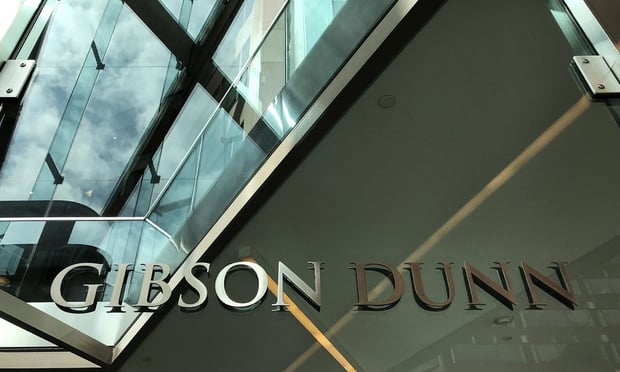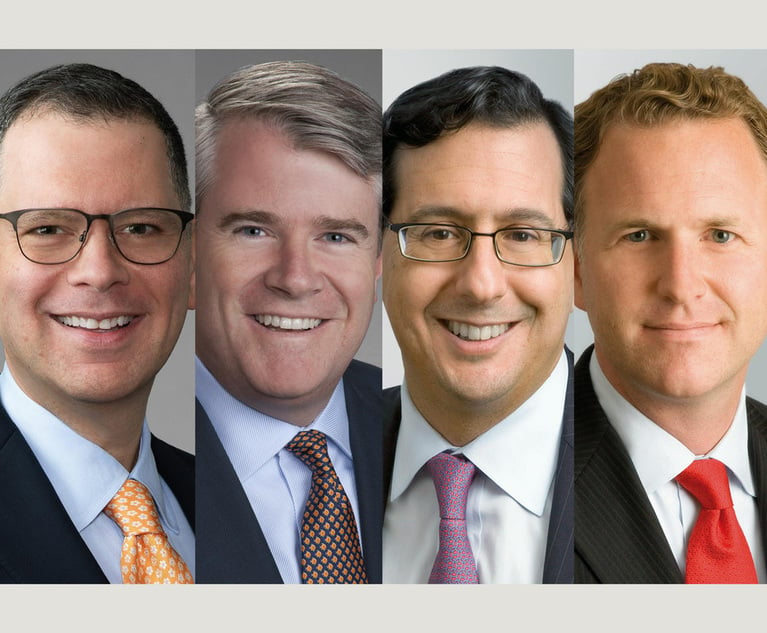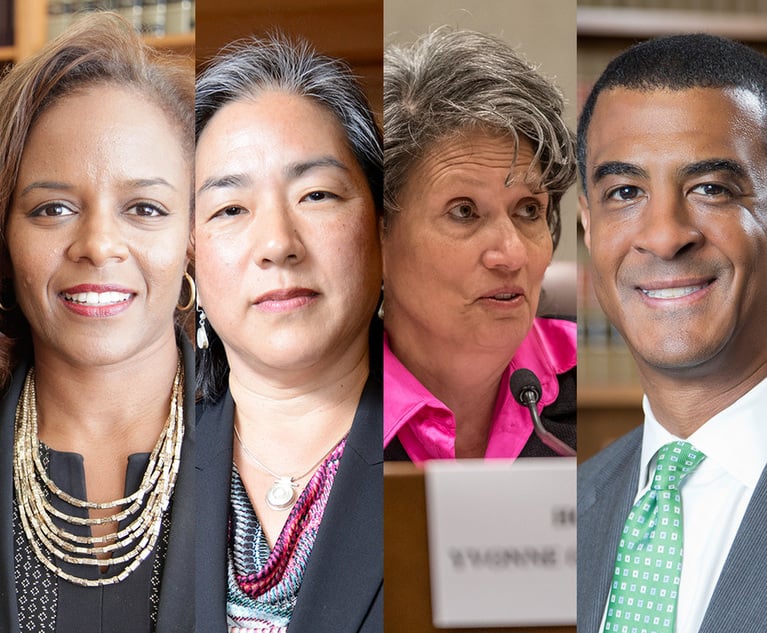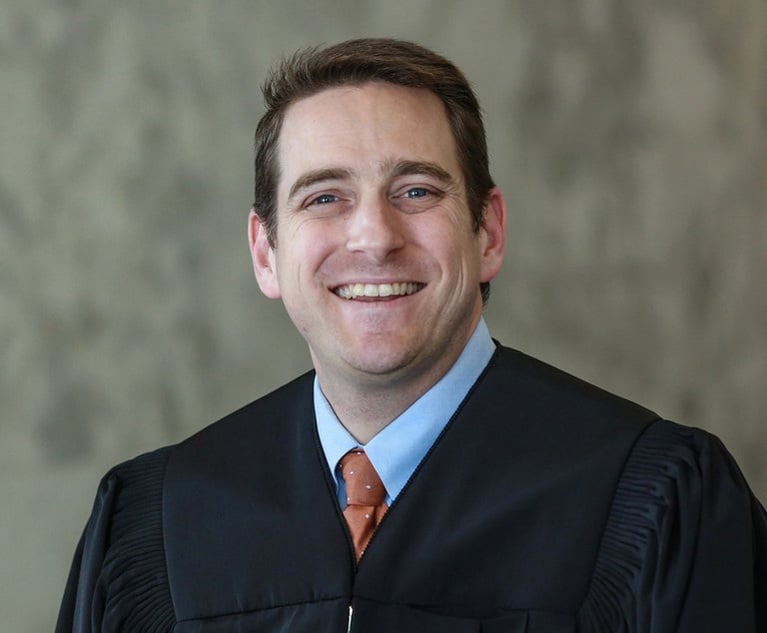Gibson Dunn Among Firms Spurned by LGBTQ Groups at Top Law Schools for Use of Mandatory Arbitration
Affinity groups at 13 elite law schools have pledged to stop accepting funding from any law firm that uses mandatory arbitration. They specifically noted Gibson, Dunn & Crutcher as a firm that continues to use it for certain employees.
November 06, 2019 at 02:44 PM
5 minute read
The original version of this story was published on Law.com
 Gibson, Dunn & Crutcher offices in Washington, D.C. Photo: Diego Radzinschi
Gibson, Dunn & Crutcher offices in Washington, D.C. Photo: Diego Radzinschi
Law student organizations that are pushing to end the use of mandatory arbitration at law firms stepped up the pressure Wednesday by pledging to forgo funding or sponsorship from firms that require some or all employees to submit to mandatory arbitration.
In an open letter released Nov. 6, LGBTQ+ student groups at 13 highly ranked law schools said they will no longer accept donations or promote law firms that use mandatory arbitration, and they singled out Gibson, Dunn & Crutcher as a firm that continues to use mandatory arbitration for certain employees. Harvard Law School Lambda, Michigan OUTLaws, UCLA OUTLaw and Yale Law School OutLaws have each severed ties with the firm, according to People's Parity Project, which co-wrote the open letter with the Harvard group.
According to the students, Gibson Dunn in 2018 agreed to stop requiring summer associates and first-year associates to submit to mandatory arbitration. But the firm stopped short of ending mandatory arbitration for other legal professionals, such a paralegals, they said. (Gibson Dunn representatives did not respond to requests for comment on the matter Wednesday.)
"If a queer summer associate is harassed for her sexual orientation, a non-binary associate is denied a promotion after they announce plans to transition, or a trans paralegal's insurance plan illegally excludes gender-affirming care, they have a right to sue," reads the letter the groups sent to Gibson Dunn. "Forced into mandatory arbitration, they may never get justice."
Meanwhile, the People's Parity Project—which started at Harvard Law School in 2018 but has since expanded with chapters at eight law schools across the country—said that Washington firm Williams & Connolly last week confirmed that it will no longer use mandatory arbitration for any employees except for partners after receiving the letter from the LGBTQ student groups. A Williams & Connolly spokesman declined to comment Wednesday, saying it is an "internal firm matter."
"We think that is more acceptable, because partners are in more powerful positions as compared to other workers," said Sejal Singh, the policy director of the People's Parity Project, in an interview Wednesday.
Less than 10% of the law firms that recruit at top schools now use mandatory arbitration, Singh said, which is a testament to the success law students have had in eradicating the practice. Their efforts began in the spring of 2018, when law students at elite schools banded together to push firms to disclose whether or not they required summer associates to sign mandatory arbitration agreements. They stepped up those efforts in the fall of 2018 by targeting specific law firms and asking fellow law students to boycott those firms during the on-campus interview process. The People's Parity Project has also staged leaflet campaigns outside the DLA Piper offices to raise awareness about mandatory arbitration.
The latest campaign by the LGBTQ student organizations centers on the efforts of law firms to recruit diverse associates, Singh said. Firms often donate money or sponsor those groups as a way to bring in diverse associate classes, she said.
"Law firms rely on affinity groups to recruit, and in particular, to recruit diversely," she said. "All these law firms claim to be LGBTQ friendly, and that's a way they recruit talented law students and brand themselves to make sure people want to come there. But you can't say you are LGBTQ friendly when you are using forced arbitration to cover up harassment, discrimination and other forms of workplace abuse."
Andre Manuel, a board member of Harvard Law School Lambda, said that his group hosts an array of recruiting and networking events for its law firm sponsors. Those include dinners and networking receptions during the recruiting season, a spring career fair in which sponsoring firms can mingle with Lambda members, as well as access to Lambda's online member network.
"Part of it is the symbolism of Lambda giving law firms their stamp of approval by allowing the sponsorship relationship," Manuel said Wednesday, "But there are also practical benefits that firms get from their sponsorship or organizations like Lambda."
In addition to the LGBTQ groups at Harvard, Michigan, UCLA and Yale, similar groups at Cornell Law School; the University of California, Berkeley School of Law; the University of Chicago Law School; Columbia Law School; Georgetown University Law Center; New York University School of Law; Northwestern University Pritzker School of Law; Stanford Law School; and the University of Pennsylvania Law School have each pledged to cut ties with firms that use mandatory arbitration.
The LGBTQ groups aren't the first to leverage their sponsorship relationships with firms to pressure them to move away from mandatory arbitration. Last December, women's associations from eight elite law schools also pledged to stop accepting donations from law firms that use such agreements. At the time, the Harvard Women's Law Association the previous month dropped Kirkland & Ellis as the primary sponsor of its spring conference due to the firm's use of those agreements. Kirkland & Ellis had donated $25,000 annually for that designation. Days later the firm said it would no longer require employees to sign mandatory arbitration agreements.
"We know all too well that women, people of color and LGBTQ people are underrepresented throughout the profession," Singh said. "The firms really rely on recruiting with affinity groups to say they are working to improve their diversity numbers. From our perspective, it's about saying, 'We're going to be honest brokers here.' If you have a policy that hides the kind of discrimination we are trying to keep our students safe from, we're not going to be encouraging people to go work there."
This content has been archived. It is available through our partners, LexisNexis® and Bloomberg Law.
To view this content, please continue to their sites.
Not a Lexis Subscriber?
Subscribe Now
Not a Bloomberg Law Subscriber?
Subscribe Now
NOT FOR REPRINT
© 2025 ALM Global, LLC, All Rights Reserved. Request academic re-use from www.copyright.com. All other uses, submit a request to [email protected]. For more information visit Asset & Logo Licensing.
You Might Like
View All
Litigators of the Week: US Soccer and MLS Fend Off Claims They Conspired to Scuttle Rival League’s Prospect

‘Listen, Listen, Listen’: Some Practice Tips From Judges in the Oakland Federal Courthouse
Trending Stories
- 1Eagles or Chiefs? At These Law Firms, Super Bowl Sunday Gets Complicated
- 2Former NY City Hall Official Tied to Adams Corruption Probe to Plead Guilty
- 3Wilmer, White & Case, Crowell Among the Latest to Add DC Lateral Partners
- 4Advance Auto Parts Hires GC Who Climbed From Bottom to Top of Lowe's Legal Department
- 5Judge Rules Georgia Railroad Can Seize Land as Landowners Vow to Fight
Who Got The Work
J. Brugh Lower of Gibbons has entered an appearance for industrial equipment supplier Devco Corporation in a pending trademark infringement lawsuit. The suit, accusing the defendant of selling knock-off Graco products, was filed Dec. 18 in New Jersey District Court by Rivkin Radler on behalf of Graco Inc. and Graco Minnesota. The case, assigned to U.S. District Judge Zahid N. Quraishi, is 3:24-cv-11294, Graco Inc. et al v. Devco Corporation.
Who Got The Work
Rebecca Maller-Stein and Kent A. Yalowitz of Arnold & Porter Kaye Scholer have entered their appearances for Hanaco Venture Capital and its executives, Lior Prosor and David Frankel, in a pending securities lawsuit. The action, filed on Dec. 24 in New York Southern District Court by Zell, Aron & Co. on behalf of Goldeneye Advisors, accuses the defendants of negligently and fraudulently managing the plaintiff's $1 million investment. The case, assigned to U.S. District Judge Vernon S. Broderick, is 1:24-cv-09918, Goldeneye Advisors, LLC v. Hanaco Venture Capital, Ltd. et al.
Who Got The Work
Attorneys from A&O Shearman has stepped in as defense counsel for Toronto-Dominion Bank and other defendants in a pending securities class action. The suit, filed Dec. 11 in New York Southern District Court by Bleichmar Fonti & Auld, accuses the defendants of concealing the bank's 'pervasive' deficiencies in regards to its compliance with the Bank Secrecy Act and the quality of its anti-money laundering controls. The case, assigned to U.S. District Judge Arun Subramanian, is 1:24-cv-09445, Gonzalez v. The Toronto-Dominion Bank et al.
Who Got The Work
Crown Castle International, a Pennsylvania company providing shared communications infrastructure, has turned to Luke D. Wolf of Gordon Rees Scully Mansukhani to fend off a pending breach-of-contract lawsuit. The court action, filed Nov. 25 in Michigan Eastern District Court by Hooper Hathaway PC on behalf of The Town Residences LLC, accuses Crown Castle of failing to transfer approximately $30,000 in utility payments from T-Mobile in breach of a roof-top lease and assignment agreement. The case, assigned to U.S. District Judge Susan K. Declercq, is 2:24-cv-13131, The Town Residences LLC v. T-Mobile US, Inc. et al.
Who Got The Work
Wilfred P. Coronato and Daniel M. Schwartz of McCarter & English have stepped in as defense counsel to Electrolux Home Products Inc. in a pending product liability lawsuit. The court action, filed Nov. 26 in New York Eastern District Court by Poulos Lopiccolo PC and Nagel Rice LLP on behalf of David Stern, alleges that the defendant's refrigerators’ drawers and shelving repeatedly break and fall apart within months after purchase. The case, assigned to U.S. District Judge Joan M. Azrack, is 2:24-cv-08204, Stern v. Electrolux Home Products, Inc.
Featured Firms
Law Offices of Gary Martin Hays & Associates, P.C.
(470) 294-1674
Law Offices of Mark E. Salomone
(857) 444-6468
Smith & Hassler
(713) 739-1250








